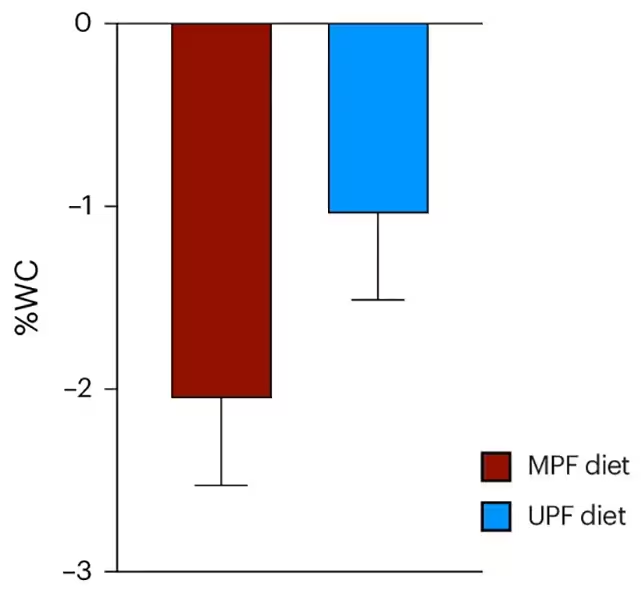5 Minutes
Scientific background and study overview
Ultra-processed foods (UPFs) — industrial formulations that often contain additives, emulsifiers and ingredients not commonly used in home cooking — have been repeatedly associated with adverse health outcomes in epidemiological research. A new randomized crossover trial conducted by researchers in the UK and US adds experimental evidence suggesting that diets centered on minimally processed foods (MPFs) can produce greater weight and body-fat loss than nutritionally matched diets built from UPFs, even when macronutrients and fiber are equivalent.
The study enrolled 50 adults with overweight and assigned them to two eight-week diet periods separated by a four-week washout. Crucially, both diet phases were matched for calories, fat (including saturated fat), carbohydrates, fiber, salt and servings of fruit and vegetables. The primary difference was processing level: one phase relied primarily on ultra-processed convenience items (for example, packaged oat bars or ready lasagne), while the other emphasized minimally processed preparations (such as overnight oats and homemade spaghetti bolognese). This crossover design helps reduce between-person variability and strengthens causal inference about the effect of food processing on weight and metabolic outcomes.
Trial design and key findings
Design details
Participants completed both diet arms in randomized order. Researchers monitored body weight, body composition (including estimates of unhealthy visceral fat), blood pressure and self-reported measures such as cravings. The controlled pairing of nutrients and foods isolates the role of food processing independent of macronutrient composition — an important methodological advance for nutrition science and metabolism research.
Main results
Both diets produced modest short-term weight loss, but the minimally processed diet yielded approximately twice the average weight reduction compared with the ultra-processed diet. On average, weight declined about 2 percent during the MPF phase versus about 1 percent during the UPF phase over each eight-week period. Participants also lost more metabolically unfavorable body fat and reported better control over unhealthy food cravings while eating minimally processed foods. The researchers noted that these differences occurred without asking participants to actively restrict calories, suggesting that processing level affected voluntary energy intake and appetite regulation.
The team extrapolated the eight-week results to longer timeframes to illustrate potential cumulative effects: scaling the trends suggested roughly 13 percent weight reduction in men and 9 percent in women after one year on the minimally processed pattern, compared with only 4–5 percent reductions after an ultra-processed pattern. Those extrapolations are illustrative rather than definitive, given the short trial duration.

Implications, limitations and future prospects
This trial strengthens the argument that food processing itself — beyond calories, fat or sugar content — influences energy balance, body composition and subjective appetite cues. As clinical scientist Samuel Dicken (University College London) points out, the study was designed to address knowledge gaps about how processing interacts with existing dietary guidance and health outcomes. Global health researcher Chris van Tulleken emphasized that the modern food system, with wide availability of inexpensive processed foods, is a major driver of diet-related poor health and obesity.
Limitations include the relatively small sample size, the short duration of each diet period, and exclusion of people with certain dietary restrictions. Future research should test longer interventions across diverse populations and explore mechanisms linking processing to metabolism — for example, effects on satiety hormones, microbiome composition or meal timing. There are also translational implications for technologies used in meal formulation and food-supply policy: nutrient profiling algorithms, food processing audits and personalized nutrition tools could incorporate processing metrics in addition to macronutrient targets.
Relevance to spaceflight and extreme environments
The findings may also interest researchers working on spaceflight nutrition and long-duration missions, where limited food variety and heavy reliance on processed, shelf-stable meals could affect astronauts' appetite regulation and body composition. Integrating minimally processed, nutrient-dense options and investigating how microgravity alters appetite and metabolism remain important topics for aerospace medicine and life-support systems design.
Conclusion
This randomized crossover trial suggests that minimizing industrial processing in the diet can improve short-term weight loss, reduce unhealthy body fat and help control cravings, even when nutritional content is matched. While additional long-term and mechanistic studies are needed, the results implicate food processing as an independent factor in obesity prevention and nutrition policy — with potential relevance from public health to specialized settings like spaceflight nutrition.
Source: nature


Leave a Comment